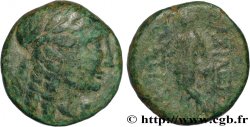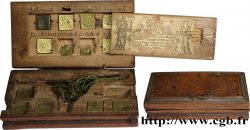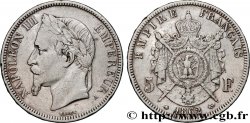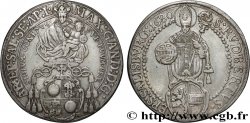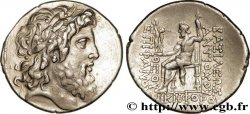上一页 1/1
v51_0257 - SIRIA - REGNO DI SIRIA - ANTIOCO III IL GRANDE Tétradrachme
MONNAIES 51 (2011)
起拍价 : 750.00 €
估价 : 1 200.00 €
竞价记录 : 1 303.00 €
出价数量 : 5
最高出价 : 1 650.00 €
起拍价 : 750.00 €
估价 : 1 200.00 €
竞价记录 : 1 303.00 €
出价数量 : 5
最高出价 : 1 650.00 €
种类 Tétradrachme
日期: c. 197-187 AC.
铸币厂名称/城市 Syrie, Antioche
材质 silver
直径 28 mm
模子方针 12 h.
重量 16,87 g.
稀少度 R2
发行人: 4e
关于品相的说明
Exemplaire sur un petit flan, bien centré des deux côtés, de haut relief. Portrait de toute beauté. Revers de style fin, bien venu à la frappe de haut relief. Jolie patine de collection ancienne avec des reflets mordorés. Conserve la plus grande partie de son brillant de frappe et de son coupant d’origine
出版目录中的项代码 :
家谱
Cet exemplaire provient de la vente Kurpfälzische Mannheim, décembre 1993
正面
正面的文字 ANÉPIGRAPHE.
正面的说明书 Tête diadémée d'Antiochus III à droite entourée de la stemma.
背面
背面的说明书 Apollon nu assis à gauche sur l'omphalos, tenant une flèche de la main droite et appuyé sur son arc de la main gauche ; dans le champ à droite, un monogramme.
背面铭文 BASILEOS/ ANT-IOCOU/ (HF)
背面的翻译 (du roi Antiochus).
评论
Mêmes coins que l’exemplaire de la collection Spaer (SNG. Spaer, n° 550, pl. 37 = Lanz 40, 25 mai 1981, n° 383, illustré dans l’ouvrage de Le Rider, p. 147, n° 268, pl. 16/20) et que l’exemplaire de la collection Dewing, (Dewing, p. 160, n° 2576, pl. 127 = Le Rider, p. 147, n° 267, pl. 16/19).
Same corners as the copy from the Spaer collection (SNG. Spaer, no. 550, pl. 37 = Lanz 40, May 25, 1981, no. 383, illustrated in the work of Le Rider, p. 147, no. 268, pl. 16/20) and as the copy from the Dewing collection, (Dewing, p. 160, no. 2576, pl. 127 = Le Rider, p. 147, no. 267, pl. 16/19)
Same corners as the copy from the Spaer collection (SNG. Spaer, no. 550, pl. 37 = Lanz 40, May 25, 1981, no. 383, illustrated in the work of Le Rider, p. 147, no. 268, pl. 16/20) and as the copy from the Dewing collection, (Dewing, p. 160, no. 2576, pl. 127 = Le Rider, p. 147, no. 267, pl. 16/19)








 对产品描述纠错
对产品描述纠错 打印
打印 分享我的选择
分享我的选择 提问
提问 Consign / sell
Consign / sell
 产品介绍
产品介绍

